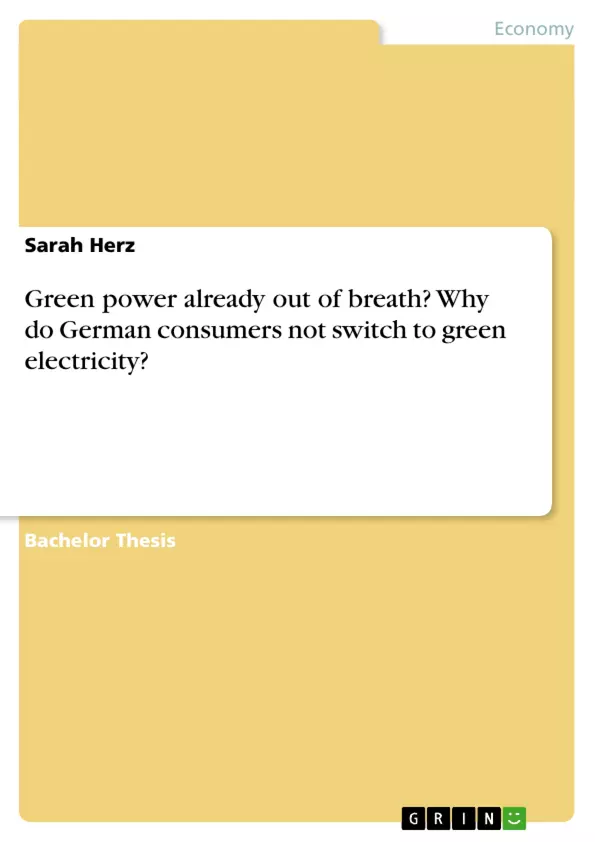The purpose of this paper is to provide a profound analysis of the motives for the non-switching behavior to green power vendors in Germany. While academic research provides many potential reasons, only a few have concentrated on internal and external influences on switching behavior as well as actual compliance with theoretical models.
In this context, a survey has been undertaken in the Federal State of Mecklenburg-West-Pomerania to analyze the personal relevance of different motives for consumers. Furthermore, the survey also aimed at analyzing the compliance of theoretical criteria, provided by the Norm Activation Model and the Theory of Planned Behavior, in order to see whether respondents intent to switch after all. Therefore, the survey was distributed via the snowball system and has been completed by 115 respondents, providing data on 77 respondents who still consume conventional power.
Though academic research has identified many potential motives for the switching inertia such as the lack of information, trust, and transparency in the electricity market, the survey at hand only confirmed one significant reason for non-switching. This reason relates to the consumers’ perception that green power is quantitatively not sufficient to supply the whole German electricity market.
Inhaltsverzeichnis (Table of Contents)
- 1. Introduction
- 2. Method
- 3. The German Electricity Market
- 4. Theory on Consumer Behavior in the Electricity Market
- 5. Motives for Non-Switching to a Green Electricity Vendor
- 6. Empirical Investigation in the German Federal State of Mecklenburg-West Pomerania
- 6.1. Sampling Method & Data Collection
- 6.2. Questionnaire Design & Measures
- 6.3. Data Analysis & Data Discussion
- 6.4. Conclusion & Assessment
- 7. Conclusion
Zielsetzung und Themenschwerpunkte (Objectives and Key Themes)
The primary objective of this research is to investigate the reasons behind German consumers' reluctance to switch to green electricity providers. It examines internal and external factors influencing this behavior, comparing it to existing theoretical models. The study aims to assess whether these models accurately predict consumers' intent to switch to green electricity.
- The dynamics of consumer behavior in the German electricity market
- Factors influencing consumer decisions regarding green electricity providers
- The influence of theoretical models like the Norm Activation Model and the Theory of Planned Behavior
- Analysis of the survey data to determine the primary motives for non-switching
- Implications for promoting green electricity adoption in Germany
Zusammenfassung der Kapitel (Chapter Summaries)
The introduction sets the stage for the research by outlining the growing global concern for environmentally friendly electricity production. It highlights the increasing awareness of climate change and the importance of finding alternative energy sources.
The research methodology is described in Chapter 2, providing insight into the chosen approach and the data collection methods employed in the study.
Chapter 3 focuses on the German electricity market, providing context for the research by outlining the existing landscape and the role of green electricity within it.
Chapter 4 delves into established theoretical models that explain consumer behavior within the electricity market, including the Norm Activation Model and the Theory of Planned Behavior.
Chapter 5 explores the various motives behind consumers' reluctance to switch to green electricity providers, analyzing factors influencing their decisions.
Chapter 6 provides a detailed account of the empirical investigation conducted in the German state of Mecklenburg-West Pomerania. It outlines the sampling methods, questionnaire design, data analysis techniques, and findings.
Schlüsselwörter (Keywords)
Green electricity, switching behavior, consumer motives, electricity market, Norm Activation Model, Theory of Planned Behavior, renewable energy, environmental concerns, climate change, survey research, Germany.
Frequently Asked Questions
Why do German consumers hesitate to switch to green electricity?
While factors like lack of trust and information are often cited, this survey found that a major reason is the perception that green power is insufficient to supply the entire market.
What is the Norm Activation Model in this context?
It is a theoretical model used to analyze how personal moral norms are activated to influence pro-environmental behavior, such as switching to renewable energy.
How does the Theory of Planned Behavior apply to green power?
This theory examines how attitudes, subjective norms, and perceived behavioral control shape a consumer's intention to switch electricity vendors.
What were the findings of the survey in Mecklenburg-West Pomerania?
Out of 115 respondents, 77 still consumed conventional power. The study highlighted quantitative sufficiency concerns as a significant barrier to switching.
Does transparency in the electricity market influence switching behavior?
Academic research suggests that a lack of transparency and trust are motives for inertia, although the survey results focused more on supply concerns.
- Quote paper
- Sarah Herz (Author), 2011, Green power already out of breath? Why do German consumers not switch to green electricity?, Munich, GRIN Verlag, https://www.grin.com/document/203200



